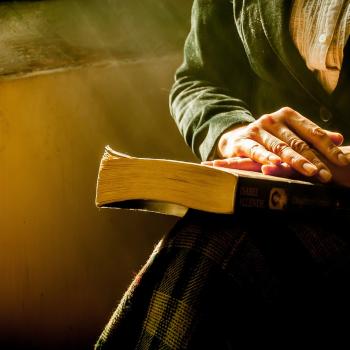Editors' Note: This article is part of the Patheos Public Square on Homeschooling and Public Education. Read other perspectives here.
While education and children are very important, both are often politicized and used as rhetorical chess pieces rather than being treated as the important, even foundational, components of civilizations' present and future. This political and rhetorical chess game overshadows the many excellent, decent, and fervent primary and secondary educators serving children in America. These educators' ideas and passion are often ignored or strained by top-down processes that do not respect their expertise, creativity, and common sense. If you couple these hurdles with the information revolution, and the democratization of this information by the internet, what you have is an educational system that fails to address many of the problems, concerns, and dilemmas of educating children in the information age. Homeschooling can be an antidote for these hurdles, if it is cultivated within a format that respects the student, the content, and the context.
Profitable education is a process that respects the student by treating him or her as a soul in need of a fully orbed educational experience—one that values the mind, heart, and hands, that is, the whole child. Such education respects the content by admitting that more educational resources exist today than at any previous time in human history. The sheer breadth of content demands that it be curated. It also demands the content be tailored to the individual students' learning strengths, weakness, opportunities, and concerns.
A central question for homeschooling families is how is individually tailored content a reality in a class of 20-30? Certainly, when it does happen it is because there are talented teachers striving for excellence. However, more often than not students are exposed only to a univocal thread of content. So while the public system majors in content uniformity, it minors in exploiting and invigorating student uniqueness. This is the bed of intellectual stagnation, and potentially a factor in explaining why many students perceive school as a necessary evil, not a joyous encounter with the good, the true, and the beautiful.
The context of where this content is relayed, no matter how expertly balanced by the teacher, places additional hurdles in front of a child. Thus, how much better would it be if the context of education is the child's home instead of a public school? At home soul-craft is administered within a comfortable context of known quantities, by a parent who has the responsibility and privilege of diligently sifting through content in order to present a lesson that stirs the intellect, imagination, and body. My wife and I have discovered that this format is producing a weight of glory that is not a product of most other educational contexts. Not necessarily because such contexts and formats cannot replicate it, but because the qualitative differences of place, attention, and understanding of individual needs provided by our home school are objectively student/child centered.
Another such instance of qualitative difference is the influence our "students" have on my wife and me. The quality pursued within our home school has challenged us to pursue other such personal and family projects with similar excellence in mind. Thus, when one speaks of a building weight of glory it is not merely hyperbole, it is also essentially pragmatic. This may sound selfish, but in reality it is a glimpse of education that very few children and/or parents ever receive. It is true that many teachers experience the profound intellectual and emotional influence students can impart, but when the student is your child the influences and experiences are not merely transactional. Rather, they are grace upon grace, blessing upon blessing. Not only do our children permeate our psyche as flesh from our flesh, but also as budding scholars bound to make decisions regarding the good, the true, and the beautiful. Such encounters imprint a burden and striving for excellence.
Such an expression of education often prompts questions and concerns regarding religious indoctrination. Obviously our faith and religious beliefs did impact this decision, but not primarily out of a fear of what may or may not be taught within our local public school system. Rather, the driving force was our overt desire to not only be parents, but also to spearhead their soul-craft. My wife specifically believes that in this season of life she is called to this path. Not because she does not want to work outside our home or to "toe-the-line" of some tribal agenda, but because, in her words, a professional career pales in comparison. So yes, a sense of calling, purpose, and the innate value of children led us to homeschool. If this is translated as religiously indoctrination than that is the prerogative of such interpreters.




